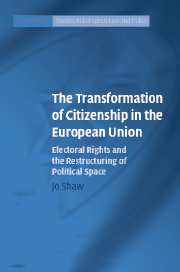 The Transformation of Citizenship in the European Union
The Transformation of Citizenship in the European Union Book contents
- Frontmatter
- Dedication
- Contents
- List of figures
- List of tables
- Preface and acknowledgments
- PART I Electoral rights in legal and political context
- 1 Introduction: electoral rights and the boundaries of the suffrage
- 2 Political membership in and beyond the state
- 3 Electoral rights for non-nationals: theoretical, legal and political accounts
- PART II The past, present and future of EU electoral rights
- PART III The contestation of electoral rights in the Member States of the European Union
- PART IV Conclusions
- Bibliography
- Index
2 - Political membership in and beyond the state
from PART I - Electoral rights in legal and political context
Published online by Cambridge University Press: 05 June 2015
- Frontmatter
- Dedication
- Contents
- List of figures
- List of tables
- Preface and acknowledgments
- PART I Electoral rights in legal and political context
- 1 Introduction: electoral rights and the boundaries of the suffrage
- 2 Political membership in and beyond the state
- 3 Electoral rights for non-nationals: theoretical, legal and political accounts
- PART II The past, present and future of EU electoral rights
- PART III The contestation of electoral rights in the Member States of the European Union
- PART IV Conclusions
- Bibliography
- Index
Summary
Introduction
In this chapter, I analyse the multivalent and controversial concept of citizenship, in both its political and its legal guises. The particular focus is upon teasing out the extent to which citizenship has a resonance out with and across the borders of individual states, and in the context of international developments such as human rights law. What meanings of a post-national, transnational, supranational or international character can citizenship have? To what extent can citizenship and nationhood be mapped according to the same criteria? The analysis leads to a set of interim conclusions about the normative attractiveness, but generally empirically under specified nature, of claims about the possibilities of citizenship beyond the state. These reflections in turn lead on to a more detailed consideration of the limited concept of ‘citizenship of the Union’ which was identified in Chapter 1 as providing the legal framework within which electoral rights are granted to citizens of the Member States across the European Union.
Citizenship as membership
There are as many definitions of citizenship as there are texts about this essentially contested concept. Some variant of the notion of ‘full membership’ of the relevant community or polity, an approach which builds directly upon the work of sociologist T. H. Marshall (1950: 28–9), seems a favoured starting point. It stresses, above all, the relational aspects of citizenship. For example, David Held (1991: 20) offers the following definition:
Citizenship has meant a reciprocity of rights against, and duties towards, the community. Citizenship has entailed membership, membership of the community in which one lives one's life. And membership has invariably involved degrees of participation in the community.
But what is full membership of any given community or polity? Many different ways of ‘cutting the cake’ of membership have been suggested. Yasemin Soysal (1994: 159), for example, highlights the two elements of rights and identity which she says make up ‘modern citizenship’.
- Type
- Chapter
- Information
- The Transformation of Citizenship in the European UnionElectoral Rights and the Restructuring of Political Space, pp. 18 - 51Publisher: Cambridge University PressPrint publication year: 2007


